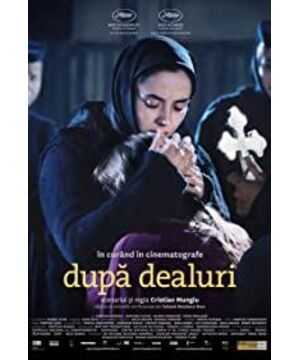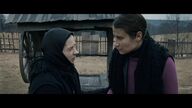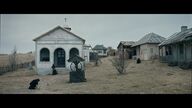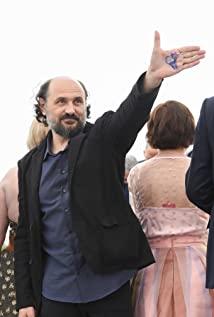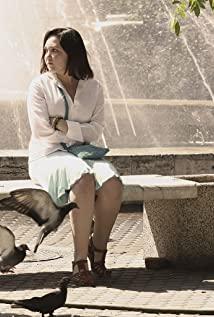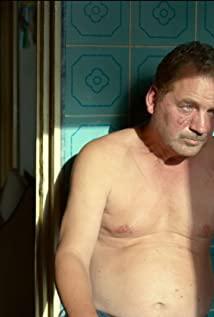Vickia and Alina, a pair of friends who grew up in an orphanage, made different choices when they were adults. Vickia chose the monastery and sought peace in life through dialogue with God. Alina chose to join the WTO to feel the warmth and coldness of the secular society more realistically. But what's interesting is that the film is actually developed from Vicky's perspective, and we can feel her life in the monastery in a solid manner, which looks plain and peaceful. Alina, who has become more accepted, came to Vikkiah’s monastery from Germany. Her past secular life is not so clear. It is not clear what kind of experience made her choose to “refuge” in the monastery. Perhaps for Alina, the monastery is indeed just a temporary place to rest, and for Vickya, her faith does not seem to be that firm, so Alina soon hopes to leave and bring Vic with her. Kiya feels a different life. "Intruders" are often the cause of dramatic conflicts. This monastery originally formed a patterned life in which the participants had no time to contemplate. Everyone's occasional complaints quickly dissipated in the inherent atmosphere. Suddenly, Alina came, with a worldly aura. In her relationship with Vickya, she seemed to be in a stronger position. Vicky, who appeared to be weaker, was upset and wanted to go out with her. It also drove a trace of commotion in the monastery.
The final development of the matter was not a story that opened another door to life. The environment and life destiny of the monastery formed a larger force field and kept them in the monastery. Next, the story moves towards the color of some exorcism movies. Alina continues to fall ill and gets worse, causing panic in the monastery. I am afraid that there is nothing that can express the divergence between religion and modern science better than the hysteria that makes people lose control of their minds and bodies. Alina will have a unified superficial understanding no matter where she is seen from her illness. It's just that modern science considers this to be a pathological phenomenon, and from the religious point of view of the monastery, it is possessed by demons. What’s special is that Alina is in a monastery relatively isolated from the outside world, and she has been unable to express and rescue herself after she fell ill. Therefore, what can help her can only be an explanation from a religious perspective, and Alina’s heretical role Also more prominent. Next, it is difficult to say that the actions of the people in the monastery were entirely based on religious thinking. It seems that there is also panic in the middle, the re-establishment of authority, and the unconscious joint force of the group. Seeing Alina being "exorcized" and seeing the hysterical and busy scenes of the crowd reminded me of the strong cow in "Killing". In the cottage full of primitive religious worship, he was equally regarded by everyone. To be heresy, tortured with a joint ritual approach. It’s just that Alina’s heresy color is stronger, and similar to Niu Shishi, she is also full of "aggressiveness", to repeatedly challenge the authority of the gods in the monastery, causing panic and confusion among the nuns, which is also the higher level of the monastery. People can't tolerate it.
Vikkiah showed an awkward attitude in the process. She became more and more crazy about her friends. She began to try to explain and reconcile the siege to everyone. However, gradually, she also fell into a group decision and watched her friends being nailed to the board. However, the monastery is not so born after all. When Alina was dying, in the hospital, the doctor said, "Just wait for you to go to jail" to break the boundary between the world and the monastery, and the monastery's values and behaviors were also incompatible. Do not accept the constraints of social universal values and laws. The scene of the confrontation between the police and the monastery in the last segment of the film is worthy of fun. The difference in values between the two hairs is very obvious, while Vicky's position seems to be seen from the details. When everyone is wearing clergy clothes, she is wearing a dress. Very usual sweater. When the priest hesitated to answer the police's question, Vickya calmly and logically described everything that her friend had endured. She did not show dissatisfaction with religion or the monastery at this time, but she appeared indifferent to everything that happened around her. She was in sharp contrast with the panicked nuns. This scene continued the director's "no position" position and all conclusions. It's all determined by the audience's position.
From my standpoint, this story is tragic. A young girl was tortured and died. In any case, this cannot be explained by values and worldview alone. Religion seems a little overbearing and ignorant in it. As at the end of the film, in the end, the power of law is needed to maintain some bottom lines, but the final result is difficult to predict. The collision of different values seems to end with the monastery being punished by law, but the film did not give the final answer immediately. The end, yes, the director was not going to give you a happy one, and he did not try to persuade the audience to believe in any point of view, although I personally feel that the director should be more critical of the position in combination with the more brutal source of the film. This is a very personal position. The audience is not happy enough to watch such a film, but there are some special receipts.
http://hi.baidu.com/doglovecat/item/7ae9d0c029403425e90f2e80
View more about Beyond the Hills reviews


